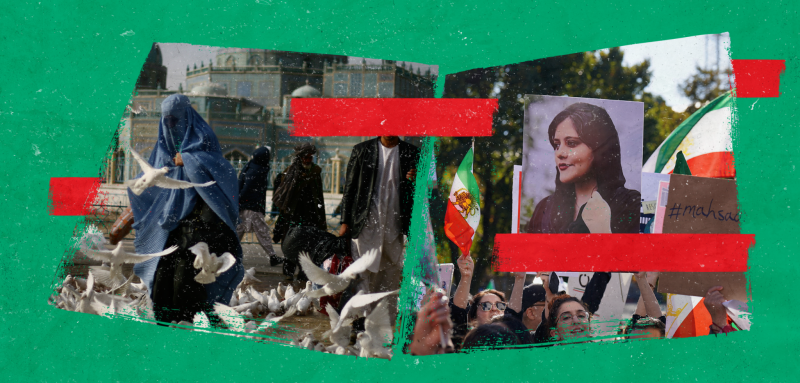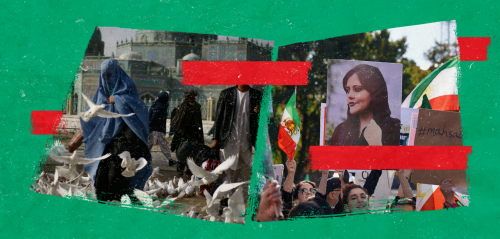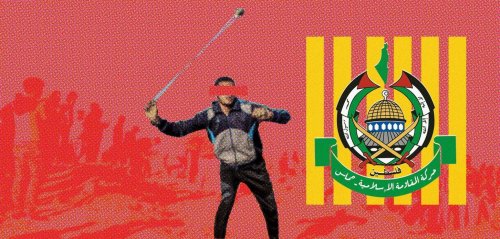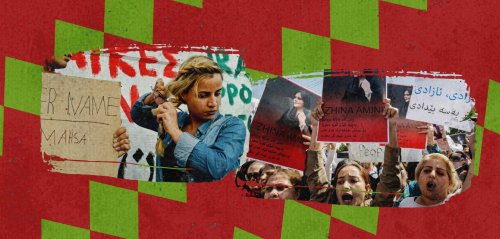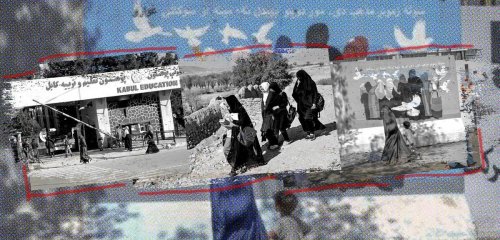When I heard an Afghan song for the first time in my life, I didn't know much about Afghanistan. But I did know the Taliban and had read a lot about them during my childhood, because Islamist groups in Gaza used to distribute leaflets and magazines that would explain about the Taliban. I never agreed with them. In fact, I had never met an Afghan in my life because I did not have the opportunity to meet any when I was in Gaza, but when I traveled outside Gaza, I met many Afghan men and women, including some who studied Dutch with me in Belgium. In one of the lessons, students had to play a song expressing their culture and nationality as a kind of cultural exchange between the students who had come to Belgium to seek asylum and safety, and escape the brutality of their regimes and their war zones. We learned about many cultures, such as Syrian, Ukrainian, Iranian, Kurdish, Afghan, and Palestinian cultures. But I paused at the Afghan song because it was the first time in my life that I listened to music from Afghanistan. I found a great affinity and felt a close connection in the type of music and the musical instruments used, and even in the Afghan way of dance, which is very similar to our Arab dance.
When I heard an Afghan song for the first time in my life, I didn't know much about Afghanistan. But I did know the Taliban. I had read about them as a child, because Islamist groups in Gaza used to distribute leaflets and magazines about the Taliban
I had never been so moved in my life by a song like this one, called "Baa Namak - Aryana Sayeed". While I was listening to the song, I remembered girls in Kabul going out in protests to demonstrate against the Taliban and demand their right to education and freedom. I began searching online for more Afghan music and the traditional heritage musical history of Afghanistan, and I was struck by the huge amount of diversity, beauty, and holiness in Afghan culture. I sat in shock, wondering why someone would try to destroy this beautiful sound and this entrancing music, and delete this diverse culture from existence? I felt sorry and sad that I did not have the opportunity to learn more about Afghan society and its culture that never got to reach us. Only the filth, extremism, and ugliness of the Taliban reached us.
A voice that identifies with dictatorship and savagery
It seems implicitly understood that the Palestinian people, like other peoples of the world, differ over political, social, cultural, and intellectual issues, as well as over international and regional issues in particular. People come together and line up in various political camps according to how their ideas, convictions, and desires allign, some leaning to the left and some to the right. This diversity in democratic systems produces pluralism and diversity that leads to progress and continuous change, as there is no constant in politics. In the Palestinian context, we have this diversity and sometimes sharp separation between political and intellectual convictions, cultural views, and ideological biases. This seems natural and important, but there is a voice calling for the unnatural in Palestinian society and other Arab societies, a voice that digs deep into support for the extremist Taliban movement under the justifications of religious affinity or rapprochement, and support for the reactionary Iranian regime under the justifications of resistance to Israel.
Although this voice is neither big nor influential, it exists and has begun to take up a large space in the public space, especially at the level of internal political debate in Palestine. This voice does not necessarily resemble the Palestinian people, who are fighting daily in all walks of life for liberation from Israeli occupation.
I was struck by the huge amount of diversity, beauty, and holiness in Afghan culture. I sat in shock, wondering why someone would try to destroy such a beautiful sound and entrancing music, and try to erase this diverse culture from existence?
This is not just my story, nor the story of the people I know, but is the story of all Palestinians inside and those in the diaspora. As a Palestinian who has lived his life under the Israeli blockade in Gaza and under the practices of a reactionary Islamist political rule, I fully understand and feel for other peoples who suffer daily from the power and authority of religious figures and the military regimes that monopolize rule in our neighboring countries and in the world. But many young people, including me, don't know much about the Afghan and Iranian communities. We haven't visited them before, we've never met them before because of our long confinement in Gaza, and all our knowledge about them was only formed from television and the Internet.
The lack of physical contact with other peoples has kept us away from friction with their internal and political issues and even their intellectual conflicts and daily discussions.
The lack of physical contact with other peoples has kept us away from friction with their internal and political issues and even their intellectual conflicts and daily discussions. However, there is a generation that was – and still is – affected by the Islamic awakening that came after the Iranian revolution during the nineties of the last century, and is saturated with the ideas of oppression and the need to impose religion as a basic system of government and daily law for people, while also fighting all lifestyles contrary to Islamic law. But this trend and this voice deliberately and intentionally forget that their culture is alien to the diverse Arab societies that house multiple religions, sects, ideas, as well as intellectual, ideological, and even class orientations. These societies are also diverse in their local and family cultures, and no single voice can prevail because it will appear as extremist and dictatorial in opinion and orientation.
But this generation is also filled with the injustice and grievances of the Palestinian cause and the American occupation of Afghanistan and Iraq. It has played a role in falsifying facts and making Islamization the only and right solution to confront foreign colonialism, despite the fact that the Islamists came late in the journey of the Arab and Palestinian struggle in particular.
I felt sorry and sad that I didn't have the opportunity to learn more about Afghan society and its culture that never got to reach us. Sadly only the filth, extremism, and ugliness of the Taliban reached us
However, many voices in Palestinian society have begun to differentiate well between liberation from the external occupation and the joint social struggle based on national unity, and the internal occupation that comes from within parts of the same society. The Taliban, with its backward, reactionary, and dictatorial policies based on prohibiting, banning, and silencing other opinions while imposing extremist Islamist ideas on society, cannot lead to the liberation and progress of society, nor even independence with national sovereignty. The Iranian regime, which imposes its ideas by force, power, and blood on Iranians, cannot play a pivotal role in liberation from colonization, because in the description of politics, it is colonialism in and of itself. The Taliban and the Iranian regime, along with Islamist groups in Palestine, Lebanon, and Syria, play a bad role in cultural replacement. They are trying to change the culture and identity of society and replace it with an alternative culture — their own narrow culture and ideas. They try to spread and impose them as if they were true and right, and this is the essence of authoritarianism, dictatorship, exclusivity, and tyranny.
In the Palestinian context, Hamas is very similar in its behavior to that of the Taliban and the Iranian regime when it comes to imposing ideas, as it leaves no opportunity without taking advantage of it to spread Islamic ideas in society, emanating from an ideology that is completely aligned behind the Muslim Brotherhood movement. Hamas has always imposed its ideas on the public space by force, such as preventing men and women from mixing in public spaces, imposing the hijab in girls' schools, enforcing gender segregation in schools, forcing female lawyers to wear the hijab, while also interfering in all public cultural and musical events, and preventing and banning most of them. Thus, it transformed society into one single mirror, forcing it to interact only with the ideas emanating from it and its ideology, and this is what Hamas succeeded in doing when it turned all these differences in society, at the cultural, social and intellectual levels, into ideas against religion and societal customs. This is its weapon of prevention.
There's a voice calling for the unnatural in Palestinian and Arab societies, a voice that digs deep into support for the extremist Taliban movement under justifications of religious affinity, and support for the Iranian regime under justifications of Israeli resistance
It also gave great authority to mosques and Islamic places of worship to play a major role in the Islamic theorizing of Hamas’s ideas in society. Although Gazans suffer in all aspects of life from the Israeli occupation policies represented by wars and the ongoing siege to this day, they also suffer within this siege, from another siege represented by Hamas' policies of ideologization, prohibition, bans, the closure of theater and cinema, the arrest of opinion holders, and the restriction of culture, knowledge, and youth and university political action. It also tries to monopolize the same national discourse in defining the Palestinian cause.
In the Palestinian context, Hamas is very similar in its behavior to that of the Taliban and the Iranian regime when it comes to imposing ideas
How can a Palestinian not support the freedom of Iranians and Afghans?
In November of last year, my wife and I participated in an Iranian demonstration in condolence and solidarity with the late Iranian young lady Mahsa (Jina) Amini, in the city of Ghent, Belgium. I didn't understand most of the slogans that were said in Farsi, but I felt their pain, their anger, and their loss of a girl who was killed by the Iranian regime because she did not wear a headscarf on her head, and also for all the activists who were killed by the regime in demonstrations calling for women's freedom.
I wondered to myself: Why would someone in Palestine support this brutal regime and stand against these victims and those oppressed? They are just like us, they suffer under a daily killing machine like us, sharing with us the suffering and the dream of living a free, independent, and dignified life. Why would someone support the Iranian regime?
My cause as a Palestinian is not more important than theirs, nor is theirs more important than mine. Together, we share the suffering and desire to be free from injustice, tyranny and occupation in societies with great culture, history, civilization, and diversity
Recently, with the Iranian demonstrations against the Iranian regime and the Taliban policies against banning girls' education, closing all educational and cultural centers, and imposing a single type of attitude and behavior on society, a large and important Palestinian voice has emerged calling for support for the rights of these peoples to freedom from the political ideology imposed on them by their peoples. This voice declares solidarity with these peoples clearly and publicly, since the lives of women in Iran matter to us as Palestinians, and the girls of Afghanistan who are deprived of freedom, education, freedom of opinion, work, and equality matter to us as Palestinians, and all the peoples of the world and our region in the Middle East care about their causes and we stand in solidarity with them.
Although this Palestinian voice of solidarity with the peoples against their regimes faces great incitement and accusations of being driven by Western and European approaches to the philosophy of freedom, this attack seems absurd in its dismantling. The Afghan people have a rich culture and a long, ancient history of fighting colonialism and attempts to liberate themselves from oppression, injustice, and dictatorship. The same goes for the Iranian people, the Syrian people, the Lebanese, the Tunisian, the Egyptian people, and African societies as well. These peoples did not start fighting colonialism with the advent of the Islamists, not even with the of Islamic intellectuals. Rather, there are those who try to make these peoples ignorant and push them to the back, trying to destroy and delete their history and culture by placing them in the category of slavery.
This voice of solidarity with Afghans and Iranians is a door for cultural communication between us as Palestinians under occupation and between them as peoples under the might of reactionary Islamic regimes. My cause as a Palestinian is not more important than theirs, nor is their cause more important than mine. Together, we share the suffering and desire to be free from injustice, tyranny, and occupation, and we dream of living a safe life in our countries and societies that possess a great culture, history, civilization, diversity, and pluralism that can build a strong and advanced society and region.
Why would someone in Palestine support this brutal regime and stand against these oppressed victims? They're just like us, they suffer under a killing machine like us. We share the suffering and the dream of living a free, independent and dignified life
As for the Palestinian voice that supports these reactionary Islamic regimes, under the pretext that they are claiming the Palestinian cause, do you accept the support of a regime that imposes the headscarf on women, kills demonstrators, and silences intellectuals, writers, artists, and musicians? Do you accept that you and your cause would be supported by a system that denies girls the right to education, work, opinion, and equality? The question to all Palestinians who wish to create global and regional popular solidarity with their cause is: How do you want the oppressed to support you while you support their executioner? And how do you want those whose executioner you support, to believe in your freedom and your cause? These are open questions for the Palestinian voice that supports these reactionary regimes.
From Palestine and as a Palestinian, I openly and clearly stand in solidarity with Afghans, Iranians, Syrians, Egyptians and all the peoples of the world and the region; with them, with their rights, and with them I defend the right to a dignified and secure life.
* The views and opinions expressed in this article are those of the author’s and do not necessarily reflect the official policy or position of Raseef22
Raseef22 is a not for profit entity. Our focus is on quality journalism. Every contribution to the NasRaseef membership goes directly towards journalism production. We stand independent, not accepting corporate sponsorships, sponsored content or political funding.
Support our mission to keep Raseef22 available to all readers by clicking here!
Interested in writing with us? Check our pitch process here!
